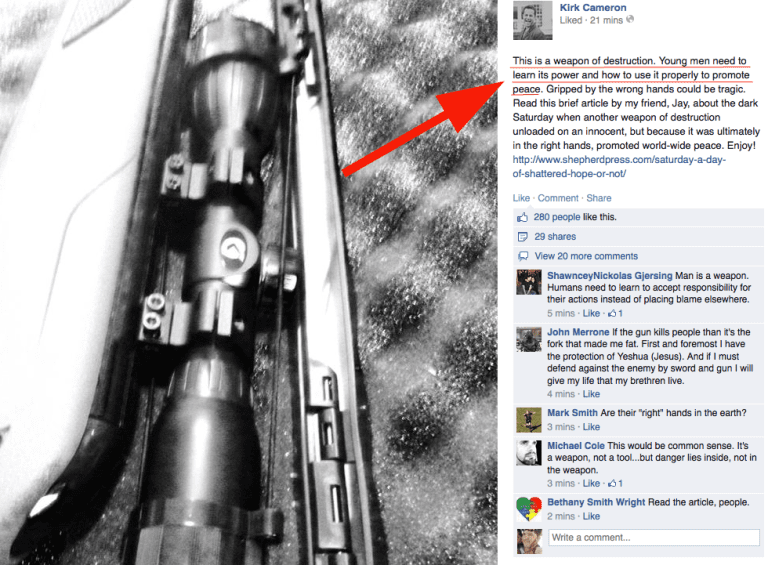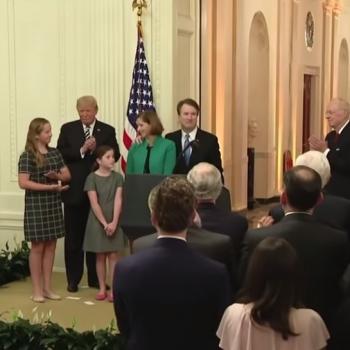In another installment of parenting according to Kirk Cameron, we find a tragic view of violence and destruction– something that certainly seems appropriate to discuss on this Memorial Day, as we remember those who have died in the service of their country. While Kirk’s post was from last month, it’s a glaring example of the kind of old, broken thinking that as Jesus followers, I hope we will run from:

Yes, you read that right. It says:
“This is a weapon of destruction. Young men need to learn its power and how to use it properly to promote peace.”
Before I point out how dangerous that last sentence is, I feel the need to give a shout out to some vets out there (and to some who are no longer with us) who were slighted by the gender discrimination in his post.
Young men need to learn its power?
So, I get it– I’m a guy who writes about nonviolence. A lot. But, I’m also a military retiree– one who was proud to have served alongside some of the most competent Soldiers, Sailors, Airmen and Marines one can find: females. I’ve even done my fair share of deployments, as well as time in hostile fire zones, and I will always look back on my female comrades with every bit as much admiration and respect as my male counterparts. So, just that small gender reference in his statement shows he doesn’t actually know much about using these “weapons of destruction”, because women make up some of the finest ranks of our nation’s armed forces.
That said, back to why stuff like this temps me to smash my face into the screen some days:
Are weapons of destruction tools that achieve peace as Kirk claims?
No. Of course not. But, let me tell you of what weapons of destruction can do for you:
They can make your enemies so dead they can’t fight back anymore. Get enough of these dead enemies, and you might even achieve what appears to be an “absence of conflict” because they’re too dead to retaliate.
But, that’s not peace.
Even worse, this technique doesn’t always achieve such a faux peace– sometimes, it actually creates more enemies. Case in point, our current drone program. With every wedding party we blow up, it’s almost guaranteed that we just created a handful of newly minted “terrorists”. I can’t say that I blame them; if a remote controlled drone blew up my daughter as she played outside our house (something we call a “bug splat” when we kill children like her in the Middle East) I’d be pretty pissed. Probably pissed enough to devote the rest of my life to killing whoever was behind the robotic bomb who killed her.
The best case scenario is always the faux peace that comes when you kill enough enemies– say, like that time we killed 90,000–166,000 people in Hiroshima and 60,000–80,000 in Nagasaki; and the worst case scenario is that you enter into a never ending cycle of mutual retaliation until there’s no such thing as good guys and bad guys– just bad guys who keep justifying their violence as a quest to “promote peace”, as Cameron calls it.
This, my friends, is not peace. Certainly, it’s not peace if stuff like God, Jesus, the Bible– you know, Christian stuff– is the measuring stick we’re using.
The most used term for “peace” we see used in scripture is the Hebrew term, shalom. In Hebrew, shalom is a pretty complex term that covers a lot of territory, showing us how complex real peace can be– something far more than the faux peace achieved by simply having a lot of dead enemies. As P.B Yoder points out in Shalom : the Bible’s word for salvation, justice, and peace (1987) the Bible itself includes in the definition of “peace”: “people or things being as they should be” (Gen 37:14), entire situations being “right” (2 Kings 5:21,22), and “positive and good relations with others” (1 Kings 5:12).
Do weapons of destruction cause people to be as they should be?
I can’t imagine it caused the thousands upon thousands who died of radiation sickness in Japan to be “as they should be”.
Do weapons of destruction cause entire situations to be right?
No, which is why I can’t bear to turn on the evening news and see a country where another mass shooting doesn’t even phase us because it’s so common.
Do weapons of destruction create positive and good relations with others?
Let’s ask the people of Afghanistan on this one– but spoiler alert– the answer is: hell no.
The power of weapons of destruction don’t achieve any of this. Which means, if we’re using the actual biblical definition of “peace” (shalom), we can safely say that teaching our young men to use weapons of destruction will not achieve it. The best it can achieve is a lot of dead or angry enemies, and that’s not a holistic view of peace. It’s certainly not a biblical view of peace.
In fact, it isn’t peace at all.
On this Memorial Day, I’d invite you to set aside the fake, plastic version of peace that culture offers us, and embrace a more holistic view of peace as found in scripture– one that cannot be achieved using weapons of destruction.
In fact, it can only be achieved without them.
But, I do agree with Kirk on one point– weapons of destruction gripped in the wrong hands would be tragic. I’d hate to see a scenario where a violent empire consistently killed innocent civilians half a world away using remote controlled planes from Nevada.











